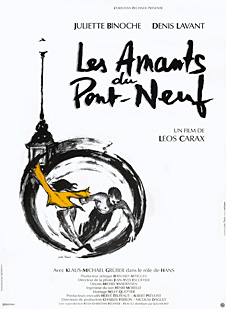THE LOVERS ON THE BRIDGE / Les Amants du Pont-Neuf
Special presentation • Drama • France, 1991
35mm • 1.66 • Dolby • Color • 125 min
Written and Directed by: Léos Carax
Cinematography: Jean-Yves Escoffier
Film Editing: Nelly Quettier
Songs: Les Rita Mitsuko
Produced by: Christian Fechner (Les Films Christian Fechner), Bernard Artigues, Alain Dahan
Cast: Juliette Binoche (Michèle Stalens), Denis Lavant (Alex), Klaus Michael Gruber (Hans), Marion Stalens (Marion)
U.S. Distributor: Rialto Pictures
Léos Carax’s ecstatic ode to doomed romance stars Juliette Binoche and Denis Lavant as tramps courting love and disaster on the streets of Paris. Alex makes his home amid the construction chaos of Pont-Neuf, Paris’ oldest bridge, closed for renovation. He relies on a meager income from fire-breathing street performances to keep him on a steady supply of barbiturates and booze. Michèle is a young artist from a well-off family who leaves home in an apparent attempt to outrun the illness that is slowly making her go blind. Alex is immediately smitten with the distraught Michèle and invites her to share his squat on the bridge. Their romance seems to defy every obstacle, but his impulse to protect her eventually morphs into a dangerous and impulsive possessiveness. By turns luridly squalid and feverishly lyrical, The Lovers on the Bridge was the most expensive film in the history of French cinema at the time of its making.
After the production setbacks, and the controversy and harsh press that greeted the release of his opus, it would be eight years before writer/director Léos Carax would return to directing. Since that time he has only completed two features, Pola X (1999), and Holy Motors (2012). Back in 1991, however, Carax was the it-director, the visionary auteur behind Boy Meets Girl (1984) and the delirious romantic thriller Mauvais Sang (1986). Influenced by Jean Luc Godard and the New Wave, Carax is associated with the “cinéma du look” movement of the 1980s, characterized by a slick visual style that sometimes pushed plot and narrative into the background, and a tendency to feature young, socially marginalized central characters. The intensely visceral actor Denis Lavant is nearly synonymous with Carax, having starred in most of his films.
“When I first saw Léos Carax’s Les amants du Pont-Neuf, I was gobsmacked. This smashing together of dirt-flecked neo-neo-realism and l’amour fou, of Maurice Pialat and Charlie Chaplin, of mad-circus, coked-up energy and silent-movie fantasy, felt and played like something at once timeless and utterly, wildly new.
The movie opens by throwing you without warning into the least romantic Paris you can imagine. “I thought this was a love story”, you might wonder during the film’s brutal opening minutes. Then, before you know it, you’re atop one of the most grandiose sets in all French movie history: a fairy-tale Pont-Neuf, built for the movie in Montpellier, that will become the stage for fireworks both literal and emotional.
Shot through with Carax’s particular brand of movie-mad romanticism, this is a picture of crazed contrasts: Juliette Binoche in full movie-star glory and an eye patch; a violent street thug who, as played by Denis Lavant, is also a Fred Astaire of acrobatic fire-breathing movement. It’s an action movie, a musical, an opera, and the closest thing modern movies have to the extreme swings and shifts of silent cinema — the cinema of Feuillade and Gance, the cinema echoed in Jean Vigo’s L’atalante.
Above all else, it is, yes, a love story — and one of the few movies to truly capture what it feels like to be in love: the pain, the ecstasy, the sheer insanity. I’m jealous of anyone who gets to experience the roller-coaster that is Les amants du Pont-Neuf for the first time.” ~ writer/director Damien Chazelle











